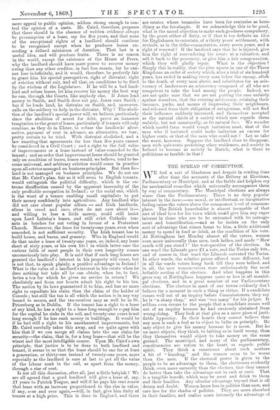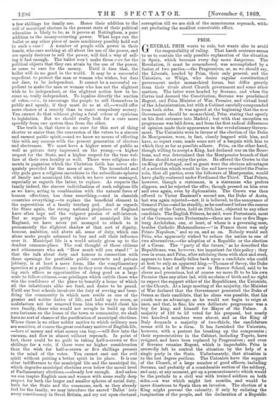THE SPREAD OF CORRUPTION.
feel a sort of blankness and despair in reading time after time the accounts of the Bribery at Elections, Parliamentary or Municipal, and at the feeble and helpless cry for mechanical remedies which universally accompanies them by way of commentary. The Municipal elections are always worse than the Parliamentary. There is no deep popular interest in the issue,—no moral, or intellectual, or imaginative feeling raises the voters above the commonest level of common- place. The British householder is almost incapable of that sort of ideal love for his town which could give him any eager interest in those who are to be entrusted with its manage- ment and beautification,—and so he insists on the only sort of advantage that comes home to him, a little additional money to spend in food or drink, as the condition of his vote. At Nottingham last Monday almost all the voters, women even more universally than men, took bribes, and made "How much will you stand ?" the test-question of the election. In one ward the Liberals gave £1 a vote, and the Tories only 108., and of course in that ward the Liberals outvoted the Tories. In other wards, the relative prices offered were different, but in all the wards voters hung back till they were bribed, and in all, the new women-voters were unfortunately the most bribable section of the electors. And what happens in this gross way at Nottingham happens more or less in all munici- pal elections, and in a great number of our Parliamentary elections. The electors in most of our towns evidently don't believe for a moment in such a thing as virtue. If a candidate comes well out of an inquiry before Commissioners, they say he is "a sharp chap," and was "too many" for his judges. It seldom even occurs to the people that a candidate comes well out of an inquiry because he had anxiously abstained from wrong-doing. They look at that plea as a mere piece of justi- fiable hypocrisy. In their hearts they cannot believe that any man is such a fool as to object to bribe on principle. He may object to give his money because he is mean. But he no more objects, they think, to bribing as in itself wrong, than they themselves would object to take money on the same ground. The municipal, and many of the parliamentary, constituencies are rotten to the heart as regards public spirit. They think a conscience about such matters a bit of "humbug," and the women seem to be worse than the men. If the electoral power is given to the people to be an advantage to them, the electresses evidently think, even more earnestly than the electors, that they cannot do better than take the advantage out in cash at once. That is a tangible benefit, which may be meat and drink to them and their families. Any ulterior advantage beyond that is all dream and doubt. Women know less in politics than men, and care less for the shades of politics. They are more absorbed in their families, and realize more intensely the advantage of a few shillings for family use. Hence their addition to the roll of municipal electors in the present state of their political education is likely to be, as it proves at Nottingham, a pure addition to the money-extorting power. What hope can the ballot or any other piece of mere machinery possibly hold out in such a case ? A number of people with power in their hands, who care nothing at all about the use of the power, and are openly desirous to sell the power, will find a way of sell- ing it fast enough. The ballot won't make them care for the political objects that they can attain by the use of the power, or cease to care for the money. Until it does that, the ballot will do no good in the world. It may be a successful expedient to protect the man or woman who wishes, but does not dare, to be independent. It cannot be a successful ex- pedient to make the man or woman who has not the slightest wish to be independent, or the slightest notion how to be- come so, really independent. To legalize directly the auction of votes,—i.e., to encourage the people to sell themselves in public and openly, if they must do so at all,—would offer more chance of a remedy than to enact compulsory secrecy. You cannot do that without giving a fatal colour of cynicism to legislation. But we should really look for a cure more speedily from one system than from the other.
The truth is, that there is no cure for this sort of thing shorter or easier than the conversion of the voters to a sincere and earnest public spirit,—and we know no means of effecting this with any success with the present generation of electors and electresses. We must have a higher sense of public as well as private duty impressed on the young,—a higher respect for the State, and a higher respect for the true wel- fare of their own locality as well. There were religious ele- ments in paganism which the Christian faith has never ade- quately provided for the mass of men. The household and city gods gave a religious sacredness to the subordinate spheres of family and municipal life, which we have never managed, especially as regards the latter, to replace. As respects the family indeed, the sincere individualism of such religious life as we have, acting in combination with the natural force of human affections, has done something,—and in clannish countries everything,—to replace the beneficial element in the superstition of a family tutelary god. And as regards the State again, the strong national prejudices of England have often kept ouf the vulgarer passion of self-interest. But as regards the petty sphere of municipal life in England, we have never yet managed to attach to it permanently the slightest shadow of that sort of dignity, honour, ambition, and above all, sense of duty, which can alone make people ashamed to buy and sell their influence over it. Municipal life is a world utterly given up to the deadest common-place. The real thought of those citizens and citizenesses who ask "How much will you stand V " is that the talk about duty and honour in connection with these openings for profitable public contracts and private jobbery, is at least a mere form, like the complimentary speeches at a public dinner ; nor do they ever dream of regard- ing such offices as opportunities of doing good on a large scale to fellow-citizens,—as privileges which entitle those who win the confidence of the place to beautify a home of which all the inhabitants alike are fond, and desire to be proud. Until our best schools inculcate the duty of serving and bene- fiting the community in which men reside as one of the greater and nobler duties of life, and hold up to scorn, as malefactors not far removed from him who would cheat his own family, those who would not scruple to build up their own fortunes on the losses of the town or community, we shall have no sort of chance of the purification of municipal elections. Where there is no other nobler motive to which ordinary men are sensitive, of course the great residuary motive of English life, —love of money and what money can buy,—will flow into the vacuum, and flow in almost without reproach. In point of fact, there could be no guilt in taking half-a-crown or five shillings for a vote, if there were no higher consideration than the wish for half-a-crown or five shillings present to the mind of the voter. You cannot cast out the evil spirit without putting a better spirit in its place. It is our utter indifference to the municipal life and the municipal tie, which degrades municipal elections even below the moral level of Parliamentary elections,—already low enough. And unless we can inspire English men and women with some really deep respect for both the larger and smaller spheres of social duty, both for the State and the commune, such as they already feel for the family, we may introduce the sacred 'Ballot' into , every constituency in Great Britain, and cry out upon electoral] corruption till we are sick of the monotonous reproach, with- out producing the smallest conceivable effect.































 Previous page
Previous page